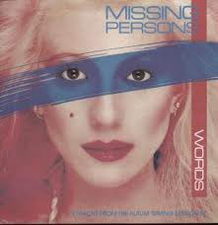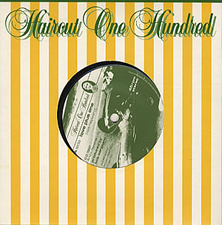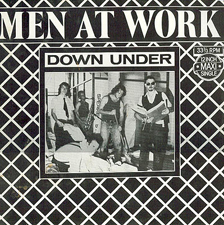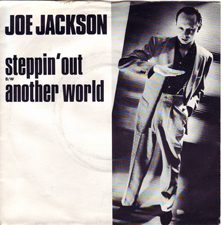
We’re letting the music do the talking for the most part, this week — because this stretch of Disc Three is all killer, no filler! Or, as panelist Mike Heyliger put it, ”If I was making a list of my 100 or so favorite songs of the ’80s (ooh, there’s an idea,) then three of this week’s five tracks would be on it.”
#6, Missing Persons, ”Words” (1982)
Peaked at #42 US, though it was a Top Ten hit in Australia.

Ted Asregadoo — Terry Bozzio’s drumming talents were surprisingly muted on “Words” and other songs by Missing Persons. Perhaps it was the complexity of working with Frank Zappa that motivated the Terry and Dale to move toward a more simple sound. Perhaps it was the New Wave that was bubbling up around them. Or perhaps it was just a desire to grab some cash by trying to write hit songs.
Whatever the case, the songs on Spring Session M were pure pop confections that brought their career out of the shadow of Zappa and into the world of contemporary hit radio. As far as “Words” goes, it’s one of the weaker singles that came off of the album. I’m more of a fan of “Walking in L.A.” and “Destination Unknown” — which, to me, sound more New Wave than “Words.”
Jon Cummings — What a bizarre blip of a career peak this band had! It’s rare for a group to have not one or two, but three big (and long-lasting — they’re all still ubiquitous on ’80s-centric stations today) radio hits off a first album, then fall to obscurity so quickly.
Jack Feerick — Yeah, to come out of Zappa’s band and then do this — it makes me think that maybe Patrick O’Hearn deserves most of the credit for the sound of Missing Persons. (Although Warren Cucurullo did end up joining Duran Duran, so there’s that.)
Dale Bozzio is an odd one. The Lene Lovich vocals, all the skin, the outfits — I guess maybe it’s supposed to be sexy? But it’s so far away from any normal person’s idea of sexy that it ends up being eerie instead.
Dave Lifton — This sounds like it started as two different songs that got combined into one. I love the chorus but could do without the squeaking in the verse. When I hear those affectations on a New Wave record a giant flag that says “COCAINE” goes off in my head. Still, for a group that’s considered a prototypical synth band they had a great guitar tone.
#7 The Human League, ”Don’t You Want Me” (1981)
Hit the top spot in the US, the UK, Canada, Belgium, Norway, New Zealand… it was pretty big, okay?
Dunphy — The dispassionate singing kind of makes the song. We were just getting into the heavy-synth side of New Wave and were on the edge of the New Romantic thing (imagining Spandau Ballet’s “True” is only a couple posts away), so the robotic delivery works. And when we talk about a song that was EVERYWHERE in its time, we’re talking about this. It was unavoidable. I’m amazed that I still have warm feelings about it.

Lifton — This was a favorite of mine at the time. I had a friend who had a Roland Juno-6, which was the coolest thing I had ever seen at the time, and I was so jealous that he could replicate the sounds of “Don’t You Want Me” almost perfectly with it. Now it just seems quaint and dated.
Last summer I was trying to write a post that compared this with Gotye’s “Somebody That I Used To Know,” with the idea being that they’re both he-said-she-said accounts of a breakup. It never got written because I got bogged down in trying to figure out if wanting your records back and shutting off all communication is as bad as ditching the guy who took you out of near-poverty for no real reason. I figured I might as well mention that here so it’s not entirely lost.
And now that I’ve written it, I see a direct connection between “Don’t You Want Me” and “To Sir With Love,” which is superior to both these songs.
Cummings — If you’re just running down the list of #1 hits, “Don’t You Want Me” is pretty much where the ’80s began, in terms of an internationalist punk/New Wave aesthetic reaching critical mass on American pop radio. (“Pop Muzik” and “My Sharona,” from ’79, refute my thesis to at least some extent, but I’ll just label them outliers and move on.) Oakey’s flat, droning vocal, the synth part any tween could re-create on a Casio … we now think of this song as a pillar of ’80s music, but at the time it sounded profoundly out of place on pop stations, which was of course what made it so dominant. It seemed like a novelty song at the time, tucked in amongst “Ebony and Ivory” and “Rosanna” and “Eye of the Tiger.” Within a year, though, pop would be replete with songs that fit more comfortably with the Human League than with Toto or Survivor.
Asregadoo — A fantastic video to a song that may not have made if it weren’t for MTV. The members of the band looked so cool in that video that it was difficult not to like “Don’t You Want Me” for the images it conjured up in one’s mind. Plus, for me, there was the “cool factor” of saying I liked The Human League — if only to differentiate myself from stoners and cholos in high school. Phil Oakey’s emotionless voice with Susan Ann Sulley’s slightly more expressive singing provided a kind of robot “He said, She said” back and forth that was undeniably novel for the time.
Feerick — This sounds so icy and sleek and futuristic that it took me a long time to realize that it is, in its format and theme, essentially a country song. Not only do the lyrics call to mind the great ”Success (Has Made a Failure of Our Home),” which Johnny Mullins wrote for Loretta Lynn; but you can easily imagine ”Don’t You Want Me” recast as a classic duet between Dolly Parton and Porter Waggoner, or Tammy Wynette and George Jones. And once you’ve imagined it, you can’t un-imagine it.
#8 Haircut One Hundred, ”Love Plus One” (1982)
Reached #3 UK,; peaked at #37 US.
[youtube id=”5_msHpEa3_Y” width=”600″ height=”350″]
Dunphy — And speaking of the New Romantic swoop-y voice, here comes Nick Heyward in Haircut One Hundred. That sound would be much more pronounced with “Whistle Down The Wind.” I can’t say I was particularly influenced in its time by “Love Plus One.” For some reason it did not get as much radio action in my neck of New Jersey. We were probably up to our butts in Bruce around this time, so marimba-laced Britpop wasn’t likely to make deep inroads. How The Human League and our next song made it relies solely on two words: “music video.”

Lifton — It’s pleasant but there’s really not that much here. Every time I hear it I don’t know what song it is until the title is sung in the chorus. There’s very little here to make it stand out among the other great singles that were coming out of Britain at the time.
Feerick — Maybe it’s a natural consequence of living in a shabby grey country that the Brits, like nobody else, know how to craft music as gloriously sunny and carefree as this. It gives me that easy-breezy tropical vibe, but it’s not really derived from island music. There aren’t any clear signifiers of ska or calypso in the arrangement — if anything, the horns make me think of South African township jive — but there’s a wonderful lightness to it. But like a lot of Brit tropicalia, there’s a deeply-buried melancholy current.
Holmes — A minor pleasure to be sure, but any song with marimba gets bonus points from me.
Cummings — This scraped the bottom of the Top 40 just as “Don’t You Want Me” reached the top, and (musically speaking) was a goofy, sunny counterpart to the other song’s dark and ominous quality. Whenever I think of “Love Plus One” I like to place it in the context of Nick Heyward’s profoundly lovely “Whistle Down the Wind” from a few years later, and revel in the fact that he was capable of both.
Asregadoo — I was a big fan of Haircut 100, but knew them first for the song “Fantastic Day.” “Love Plus One” wasn’t as jaunty as the aforementioned single, but the video did reveal another side to the New Wave of music coming from the UK: preppy rock. The guys in the band looked harmless, probably liked to cuddle with their girlfriends, and engage in really rough behavior like munching on toast and sipping tea in the summer time. Hardly edgy as a public persona, but clearly Nick Heyward demonstrated that he was a master of pop music.
#9 Men At Work, ”Down Under” (1981)
Hit #1 just about everywhere.
Holmes — God, what a great song. And what choreography in the video! What else is there to say?
Feerick — Told you it was going to be a short column, folks.
Lifton — Even bigger than “Don’t You Want Me” in the early-80s was Men At Work. Those first two albums were huge in my life, and their silliness appealed to my adolescent sense of humor. I had gotten over it by the time Two Hearts came out in 1985, because I had discovered Springsteen by then. But I think their best singles still hold up, not just as nostalgia, but as very well-crafted songs.
Feerick — As the youngest of six kids, I grew up listening to the canon of classic rock and pop — even the edges of postpunk and the New Wave — secondhand, via my older siblings. Men At Work was the first band that I ever felt was mine, my own from the start and not an inheritance from someone else.

Asregadoo — Ah, Men At Work…I have such hot and cold views of this band. A flute (!) as the dominant instrument in the song made it less New Wave than a throwback to the wimp rock of the ’70s. Indeed, if if wasn’t for the quirky acting of Colin Hay in the videos, I’m not sure if Men At Work would have been able to conquer the world of popular music. That said, there’s certainly there’s no denying that “Down Under” is a good song. It has many of the requisite elements that make for great pop music: memorable music hooks, a catchy chorus, and verses that tell a kind of story of a land that very few knew about. The Australian Ministry of Cultural Domination must have been very happy when “Down Under” came out because without it, it’s possible there would be no Foster’s Lager in the U.S., Outback Steakhouse, and Aussiewood.
Dunphy — And who could forget the music video to this. People gravitated to Men At Work because they were goofy and affable. But if you sit with the Business As Usual album and listen to it as its own thing, attempting not to be influenced by the hits, you find it is a really sturdy record… a lot more to it tonally, despite it being very “snappy” in that ’80s kind of way (I’ve wondered what a slowed-down take of “I Can See It In Your Eyes” would be like). Had the record been taken in this manner, I think the band would still exist in some form or another. But the sheer mass of “Down Under” and “Who Can It Be Now” might have made it difficult for the audience to give the buy-in to “Be Good Johnny” or “Touching The Untouchables.”
Feerick — Kind of a pity how their career track went down, though. Yes, they had tremendous chops and versatility, and could operate in any number of different modes. But even on Business As Usual you can hear them defining those modes and settling in to ring variations on them; they had already largely settled on a sound before making their first record — and while that made them distinctive right from the start, it didn’t leave them much of anyplace to go. By the time Cargo was released, they had allowed themselves to be defined as a ”quirky” band, and it became a straitjacket.
Cummings — Massive cultural impact … at least in terms of forcing a generation of American schoolkids to wonder what the hell’s going on in Australia. Who didn’t head off to the grocery store in search of vegemite?
Mike Heyliger — That stuff looks like green vomit. I wouldn’t go near it with your taste buds.
Holmes — While I’ve never tasted ass before, I have tasted Vegemite. I imagine the two aren’t far apart on the flavor spectrum.
Cummings — I was not a Men At Work fan, generally — I really, really hated “Who Can It Be Now,” “Be Good Johnny” and pretty much everything else that came out of Colin Hay’s mouth — but “Down Under” is undeniable. And just in the last couple of years, as I’ve encountered Hay on satellite radio singing a stripped-down version of “Overkill” and some of his newer, calmer stuff, I’ve recognized that what I was reacting against was more the honking, screeching quality of MaW’s overall sound.
When I was a freshman in college, Bob Cashill and I were friends (I suppose) with a girl who, among her many bizarre qualities, loved to sing along to her favorite band … Men At Work … while rocking furiously back and forth in a rocking chair in her dorm room. But here’s the kicker — she wouldn’t sing along to the melodies, but would create her own harmony parts (even through the verses) and sing them at the top of her lungs. It was an impressive skill, I guess, but poorly and freakishly applied. And for 30 years I can think of little besides this girl whenever Men At Work come on the radio.
Feerick — Men At Work: your soundtrack for life along the autistic spectrum.
#10 Joe Jackson, ”Steppin’ Out” (1982)
Jackson’s biggest US hit, peaking at #6.
Michael Parr — If you were to call my phone, the ringtone alerting me to your call would be Joe Jackson’s “Steppin’ Out.” Yes, dear readers, I love this song that much. It’s about as perfect as piano-pop gets.
Feerick — Thanks for stopping by with that tidbit, Michael. Or should I say thanks for… stepping in.
I’ll get my coat.
Cummings — In which Jackson tamps down the assholery, cranks up the sophistication, and turns in a stone-cold classic that proved (for many) that synths could serve as the basis for mature, classy, popular rock’n’roll. Frankly, though, I’d rather listen to “Breaking Us in Two” or “Real Men,” because after a while the monotony of “Steppin’ Out” got to me a little bit.

Holmes — Well, I’ll probably be back on a Joe Jackson kick for the rest of the week thanks to this. This is pop perfection, and from a stunner of an album to boot.
Asregadoo — The gateway song for my love of Joe Jackson. I was certainly aware of “Is She Really Going Out With Him,” but it didn’t quite grab me as “Steppin’ Out” did. Perhaps it was the way in which the organic sound of the piano complimented the driving beat of the rhythm synth track that just screamed (or maybe coolly announced) “sophistication.”
1982 was a year when the ground was shifting for pop music, so while there was still plenty of the old standby sounds of the ’70s (J. Geils Band, John Cougar, Steve Miller and Toto), the more interesting sounds coming from the likes of Joe Jackson, The Police, The Go-Go’s, A Flock of Seagulls and those on this list signaled a real departure from what was the mainstream. Now, whether Joe Jackson was really New Wave is debatable, since his next album was movie soundtrack (Mike’s Murder), followed by an exploration of the intersection of jazz and pop on Body and Soul. But to me in 1982, he was most certainly New Wave.
Dunphy — Joe Jackson is one of those artists that I actively envy the talent they possess. His latest The Duke didn’t really do it for me, but when he’s “on” he can get as close to perfect as any one performer can. Here’s the kicker — as good as “Steppin’ Out” is, and it is mighty good, he does a slowed down version I like even better. In concert he would pair it with “Shanghai Sky” and for ten or so minutes the listener could just sink into the thing.
I’ve never fully understood why he isn’t ranked higher on the piano-rock scale. He’s revered, but for some reason you’re not likely to find Elton or Billy singing Joe’s praises. I suppose it’s the early punk influences…
Holmes — I always thought of Ben Folds as a direct musical descendant of Joe’s. Sort of that same pop sensibility married with the snarling rock attitude. Although Joe has always been more creatively restless, as evidenced by the sheer variety of styles he’s tackled.
Feerick — Which is why it’s kind of funny that this should be such a big hit, and so many people’s first exposure to Joe Jackson, since it’s so atypical of his work. He’d never sounded so unironic, so sentimental — and his trademark sound is entirely absent. There’s no guitar, no jazzy rhythm section, no snark. But Ted’s nailed it: the contrast of sparkling grand piano with the intentionally-stiff tick-tock of the machine backing is terribly effective. As much as I may prefer more musically- and emotionally-complex work like ”It’s Different For Girls” or ”You Can’t Get What You Want (til You Know What You Want),” the simplicity and directness of this wins me over every time.
Lifton — I co-sponsor all the praise that has been given to this song ahead of me. This is as good as it gets.





Comments